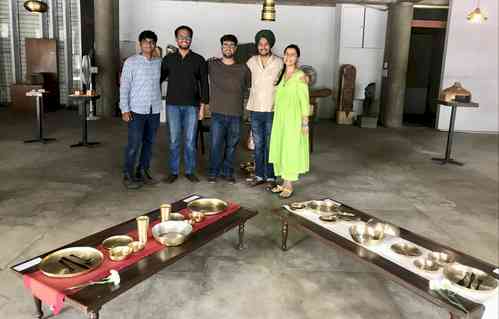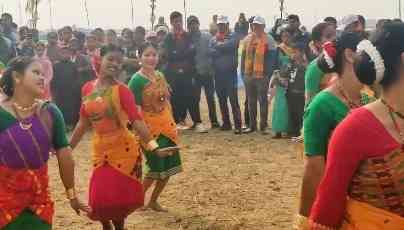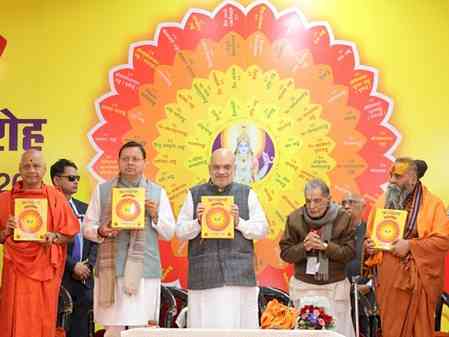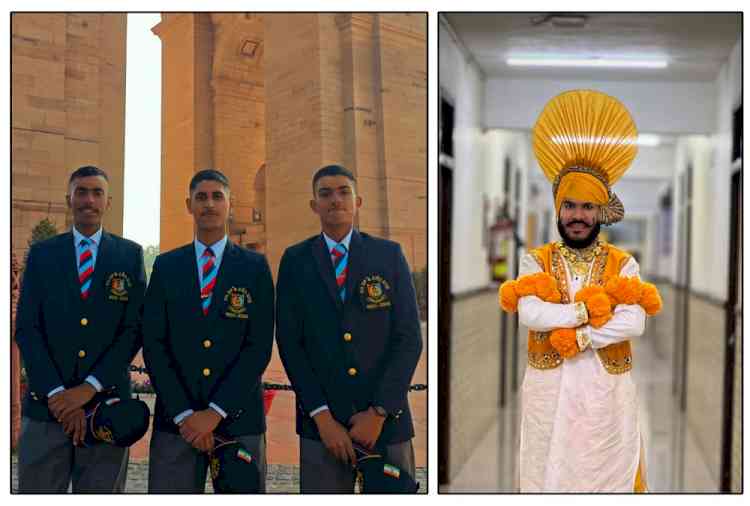Wah USTTAD! Bend it like metal craft of Jandiala Guru
So even they were stunned to witness the final products for they were nothing like the ones they had been making for generations. These 80 articles perfectly fit contemporary lifestyles -- cook wear, serve wear, bar sets, and home decor. Most said that it was hard for them to believe they had made them.

New Delhi, Aug 15 (IANS) So even they were stunned to witness the final products for they were nothing like the ones they had been making for generations. These 80 articles perfectly fit contemporary lifestyles -- cook wear, serve wear, bar sets, and home decor. Most said that it was hard for them to believe they had made them.
The Thatheras of Jandiala Guru, the only craft of India to be recognized as UNESCO’s Intangible Cultural Heritage, practiced near Amritsar in Punjab are a community of skilled artisans known for their exceptional craftsmanship in traditional copper, brass, and bronze utensils.
A collaboration with the National Institute of Design (NID) which involved three major Design Development Workshops at Jandiala Guru, with 22 artisans, including two master artisans held recently was nothing short of a revelation for the craftsmen.
For generations, they have honed their expertise in creating a wide range of handcrafted items, such as pots, pans, bowls, and other kitchenware. The art of metalwork among the Thatheras has been passed down through families for centuries, with each generation preserving and perfecting the techniques and designs.
The process involves melting and shaping raw copper, brass, and bronze into exquisite pieces of functional and decorative art. The artisans use traditional tools and methods, eschewing modern machinery to maintain the authenticity of their craft.
The craftsmanship of the Thatheras of Jandiala Guru is not only renowned for its beauty but also its practicality. Their utensils are durable, have excellent heat conductivity, and are often used in Punjabi households for cooking traditional dishes and serving meals during special occasions and festivals.
The Ministry of Minority Affairs, Government of India has appointed NID as one of the 'Knowledge Partners' for USTTAD scheme. The project was launched for the benefit of minority communities of India who are engaged in the practice of traditional crafts.
Speaking to IANS, Tanishka Kachru (Project Co-Head USTTAD), says the most important part of the initiative was to work where the artists were placed as that turns out to be more meaningful. “When you are in their space, it is co-creation. You are also looking at their materials and tools, the designs that emerge, and how they are harnessed.”
The workshop was not just about forms and new things but also how their processes can be streamlined and if any new tools can help them. Not to mention, ensuring their health and safety while working can be improved. “So you see, it goes beyond design,” says Kachru, former Assistant Curator at the Victoria and Albert Museum in London
The workshop's purpose was not only to keep the existing traditions but also to introduce new and contemporary lifestyles in the process. “And to also think about the target consumer and sometimes the artisan is not aware of that,” adds the Discipline Lead of Exhibition Design at NID, Ahmedabad.
A team of four designers and one teacher along with three young graduates held three workshops in Amritsar. USTTAD has been an initiative that has allowed real-time assessments on the ground, and now based on the gaps there are identified, the needs have become clear. These include providing microfinance, opportunities for the artisans to take the designs and develop themselves as entrepreneurs and also think about material procurement.
“And that is where the govt needs to step in and provide the facilities to artisans and find channels to market the products. It allows to throw light on these projects and that helps the other ministries to encourage it and grow it as well,” says Kachru
Stressing one of the important things that can help grow any craft is to integrate it into our education and see it as a process and not as an aesthetic, she says schools and colleges can take advantage of this in their curriculum. “Also, the private sector needs to go deeper and not just focus on commissioning diyas and cards on Diwali from craftsmen.”
Sahil Thappa, Cluster Head of Thatheras of Jandiala Guru (Faculty of Product Design, NID) says that while they were uncomfortable when they went with their CAD designs, breaking them down in their own language solved the problem. “They wanted us to sit by their side lest the expensive raw material was ‘wasted’. By the next workshop, they were confident enough. The souvenirs produced can be used by governments and corporates for gifting. Also, after validation, we would like to involve an e-platform where a portion of this collection can go.”


 IANS
IANS 









